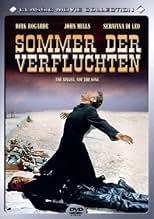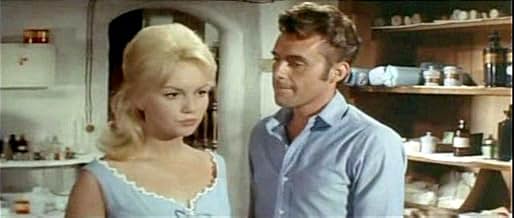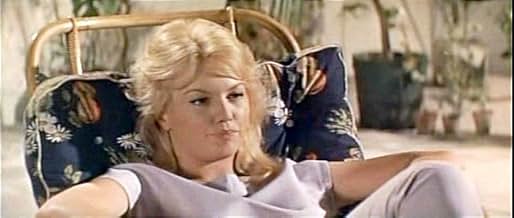IMDb RATING
6.2/10
736
YOUR RATING
In a small Mexican town, a Catholic priest (Sir John Mills) and a local bandit (Sir Dirk Bogarde) clash, but the brave priest ultimately wins the outlaw's respect.In a small Mexican town, a Catholic priest (Sir John Mills) and a local bandit (Sir Dirk Bogarde) clash, but the brave priest ultimately wins the outlaw's respect.In a small Mexican town, a Catholic priest (Sir John Mills) and a local bandit (Sir Dirk Bogarde) clash, but the brave priest ultimately wins the outlaw's respect.
- Director
- Writers
- Stars
Norman Florence
- Vito
- (as Nyall Florenz)
Arthur Brough
- Burning haystacks Farmer
- (uncredited)
- Director
- Writers
- All cast & crew
- Production, box office & more at IMDbPro
Featured reviews
Another of these movies where Dirk Bogarde got lost.Why on earth did he have to get involved in that business?The screenplay has enormous pretensions and suggests homosexual tendencies between the priest and the all dressed-in-black Bogarde as well as a love which blonde Mylène Demongeot feels for the same priest!which is a bit too much!Luis Bunuel could have got away with it,but the director here is not in the same league.The screenplay is incoherent and the three leads are finally unconvincing.The title is absurd (Bogarde likes the singer (the priest?) but not his song(his Christian message?).It was also to be a Rolling Stone song with a nice dulcimer arrangement by Brian JOnes in the mid-sixties.
But here Bogarde's fans can have a look,but be warned:it's the actor,not the movie.
But here Bogarde's fans can have a look,but be warned:it's the actor,not the movie.
Slow-moving but compelling psychological Western about a determined priest who arrives at a small town that seems to be mysteriously dominated by a local bad guy, and decides to fight him in his own peaceful way; their confrontations make the movie. Literate script (just a quote: "Isn't that your job, Father; To keep hoping that any soul can be saved, even mine?", asks the bandit), exceptional acting by the two leads (and very unexceptional acting by Mylene Demongeot). (***)
My first (and for a long time) only viewing of this film was way back in the mid-1980s (during the early days of VHS in my neck of the woods) via a tape of a local TV screening my father loaned from a friend of his; even though I was aware of a couple of Italian TV showings over the years, I never managed to catch up with it – until another friend of my father’s alerted me (around Good Friday of last year) that it had been released – and, as it happens, subsequently deleted – on R2 DVD in the UK…which is how I eventually reacquainted myself with it on the day marking the centenary of one of its lead actors, John Mills. The reason I went into such detail about my previous experience with this particular film is because, even though it’s been 23 years since my sole viewing of (what is nowadays perhaps considered) a fairly obscure title, I myself have never forgotten it.
The ‘rejected priest in a godless Mexico’ theme recalls John Ford’s THE FUGITIVE (1947) and Luis Bunuel’s NAZARIN (1959), while the ‘homosexual undertones in a Western setting’ angle is reminiscent of the Howard Hughes/Howard Hawks concoction THE OUTLAW (1943) – with henchman Laurence Naismith’s ambiguous father-son-lover relationship with bandit leader Dirk Bogarde being particularly a throwback to the Thomas Mitchell/Jack Beutel one in the earlier film. Incidentally, THE SINGER NOT THE SONG’s controversial ending plays almost like a male version of that featured in yet another steamy over-the-top Western – DUEL IN THE SUN (1946)! This was the fourth of six collaborations between Mills and director Baker and which also included the latter’s debut, THE October MAN (1947) – a well-regarded thriller I’d love to watch and which, incidentally, has just been released on R2 DVD as part of a “John Mills Centenary Collection”. Bogarde, who himself considered the whole thing “beyond camp”, is almost always completely black-clad and, at one point, even sports cool shades!; here, he was already beginning to bravely delve on screen into his real-life gay side – which would come to full fruition later that same year in Basil Dearden’s VICTIM and other later acclaimed international films.
Nigel Balchin’s complex screenplay is at once fascinating and heavy-going, occasioning a few lulls particularly during the last third of the film’s lengthy 132-minute duration; besides, the ‘alphabet murders’ element to Bogarde’s tyrannical rule – not to mention pretty, pouting Mylene Demongeot’s forbidden love for middle-aged priest Mills – isn’t very convincing. On the other hand, Otto Heller’s spectacular color cinematography and Philip Green’s playfully evocative score, stand out as undeniable assets to the film. Having said that, DD Video’s full-frame presentation would have usually put me off acquiring a title on DVD – but, for the reasons delineated in my introduction, I gladly made an exception in this case.
Roy Ward Baker’s accompanying brief interview is very interesting: he wasn’t keen on doing the film himself but concedes now that it is beautifully-made; he also discloses that, initially, it was supposed to star Richard Burton instead of John Mills (but he was only interested in playing the bandit…except that the role was always intended for Bogarde – this, in fact, turned out to be the last film the latter made under contract to Rank) and that there was a mysterious enmity between the two male stars. I usually enjoy listening to Ward Baker’s Audio Commentaries (on his Hammer flicks) and, while I would have liked one for THE SINGER NOT THE SONG as well, the fact that he is now in his nineties and that he does not have fond memories of the shooting of the picture has understandably put paid to that prospect!
The ‘rejected priest in a godless Mexico’ theme recalls John Ford’s THE FUGITIVE (1947) and Luis Bunuel’s NAZARIN (1959), while the ‘homosexual undertones in a Western setting’ angle is reminiscent of the Howard Hughes/Howard Hawks concoction THE OUTLAW (1943) – with henchman Laurence Naismith’s ambiguous father-son-lover relationship with bandit leader Dirk Bogarde being particularly a throwback to the Thomas Mitchell/Jack Beutel one in the earlier film. Incidentally, THE SINGER NOT THE SONG’s controversial ending plays almost like a male version of that featured in yet another steamy over-the-top Western – DUEL IN THE SUN (1946)! This was the fourth of six collaborations between Mills and director Baker and which also included the latter’s debut, THE October MAN (1947) – a well-regarded thriller I’d love to watch and which, incidentally, has just been released on R2 DVD as part of a “John Mills Centenary Collection”. Bogarde, who himself considered the whole thing “beyond camp”, is almost always completely black-clad and, at one point, even sports cool shades!; here, he was already beginning to bravely delve on screen into his real-life gay side – which would come to full fruition later that same year in Basil Dearden’s VICTIM and other later acclaimed international films.
Nigel Balchin’s complex screenplay is at once fascinating and heavy-going, occasioning a few lulls particularly during the last third of the film’s lengthy 132-minute duration; besides, the ‘alphabet murders’ element to Bogarde’s tyrannical rule – not to mention pretty, pouting Mylene Demongeot’s forbidden love for middle-aged priest Mills – isn’t very convincing. On the other hand, Otto Heller’s spectacular color cinematography and Philip Green’s playfully evocative score, stand out as undeniable assets to the film. Having said that, DD Video’s full-frame presentation would have usually put me off acquiring a title on DVD – but, for the reasons delineated in my introduction, I gladly made an exception in this case.
Roy Ward Baker’s accompanying brief interview is very interesting: he wasn’t keen on doing the film himself but concedes now that it is beautifully-made; he also discloses that, initially, it was supposed to star Richard Burton instead of John Mills (but he was only interested in playing the bandit…except that the role was always intended for Bogarde – this, in fact, turned out to be the last film the latter made under contract to Rank) and that there was a mysterious enmity between the two male stars. I usually enjoy listening to Ward Baker’s Audio Commentaries (on his Hammer flicks) and, while I would have liked one for THE SINGER NOT THE SONG as well, the fact that he is now in his nineties and that he does not have fond memories of the shooting of the picture has understandably put paid to that prospect!
Who thought that it would be a good idea to have the two main male parts played by actors with posh English accents in a film set in Mexico, I saw no trace of an Irish accent from John MIlls that's been mentioned by others. An interesting film let down by poor casting, Dirk's character should have been a lot more butch as he was as threatening as Julian Clary. John's priest should have been a lot younger. Set in the 1960s but in the style of the 1930's, a very odd jumble of a film.
This movie leaves so many various impressions on a viewer, it is impossible to form a final opinion. To begin with, it is a British western, with two great British actors in the leads. Then, there is the actress, looking quite like Bardot. And then, even the atmosphere reminded me of "Et Dieu... crea la femme" in certain scenes (Bogarde called it camp, and you can see why).
During certain scenes you are thinking that it will go the way of other movies with similar plot ("Satan never sleeps" is an example), ending in infinite praise of the religion, without measure or sense. But then it turns the other way and surprises you. And in the end you come to see that even some deep religious deeds can be interpreted as acts of latent homosexual love... I know it sound bad but, somehow, unlike modern movies, the topic is introduced subtly.
Anyway, you should see it yourself and decide whether you like it or not...
Did you know
- TriviaAfter the J. Arthur Rank Organisation insisted that Sir John Mills had to play the priest, Sir Dirk Bogarde became so incensed that he told director Roy Ward Baker: "I promise you, if Johnny plays the Priest, I will make life unbearable for everyone concerned."
- Quotes
Anacleto Comachi: Is it the song that is good, or the singer that makes it so?
- How long is The Singer Not the Song?Powered by Alexa
Details
- Runtime
- 2h 12m(132 min)
- Sound mix
- Aspect ratio
- 2.35 : 1
Contribute to this page
Suggest an edit or add missing content




















